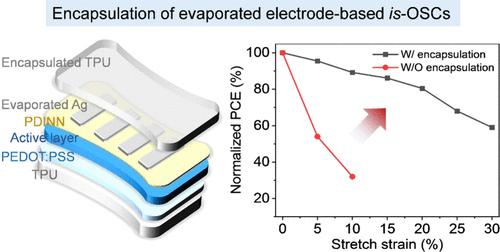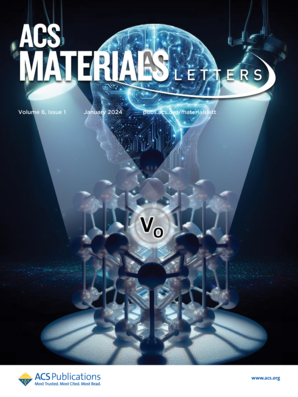通过封装策略实现基于蒸发电极的本征可拉伸三元有机太阳能电池
IF 9.6
1区 化学
Q1 MATERIALS SCIENCE, MULTIDISCIPLINARY
引用次数: 0
摘要
有机太阳能电池的机械性能对于确保其在可穿戴或可拉伸电子产品中的应用至关重要。在这里,我们在活性层混合物中引入了聚合物受体(N2200),并通过封装策略实现了带有蒸发电极的本征可拉伸有机太阳能电池(is-OSCs)。N2200 的加入同时增强了 is-OSC 的机械拉伸性和 PCE,这归功于聚合物链缠结的增强,并且 N2200 可以作为领带分子在小分子域之间提供电连接。更重要的是,封装蒸发电极基异构有机碳酸酯可显著改善其机械伸展性,在 20% 的大应变下可保持 80% 的 PCE,而未封装异构有机碳酸酯的应变仅为 2.5%。此外,封装的 is-OSC 在 15%的拉伸应变下经过 1000 次测试循环后可保留 67% 的 PCE,而未封装的器件在 5%的小应变下经过 200 次测试循环后只能保留 33% 的 PCE。本文章由计算机程序翻译,如有差异,请以英文原文为准。

Realization of Evaporated Electrode-Based Intrinsically Stretchable Ternary Organic Solar Cells through Encapsulation Strategy
The mechanical properties of organic solar cells are of great importance to ensure their application in wearable or stretchable electronics. Here, we introduce polymer acceptor (N2200) into the active layer blend, and realize intrinsically stretchable organic solar cells (is-OSCs) with evaporated electrode via encapsulation strategy. The incorporation of N2200 simultaneously enhances the mechanical stretchability and PCE of is-OSCs, attributed to the enhanced polymer chain entanglement, and N2200 can act as tie molecules to provide electric connection among small molecule domains. More importantly, encapsulating the evaporated electrode-based is-OSCs leads to significant improvement in its mechanical stretchability, with 80% PCE retention under a large strain of 20%, compared to <2.5% strain for the unencapsulated ones. Additionally, encapsulated is-OSCs retained 67% PCE after 1000 test cycles at a stretch strain of 15%, whereas unencapsulated devices can only retain 33% PCE after 200 test cycles under a small strain of 5%.
求助全文
通过发布文献求助,成功后即可免费获取论文全文。
去求助
来源期刊

ACS Materials Letters
MATERIALS SCIENCE, MULTIDISCIPLINARY-
CiteScore
14.60
自引率
3.50%
发文量
261
期刊介绍:
ACS Materials Letters is a journal that publishes high-quality and urgent papers at the forefront of fundamental and applied research in the field of materials science. It aims to bridge the gap between materials and other disciplines such as chemistry, engineering, and biology. The journal encourages multidisciplinary and innovative research that addresses global challenges. Papers submitted to ACS Materials Letters should clearly demonstrate the need for rapid disclosure of key results. The journal is interested in various areas including the design, synthesis, characterization, and evaluation of emerging materials, understanding the relationships between structure, property, and performance, as well as developing materials for applications in energy, environment, biomedical, electronics, and catalysis. The journal has a 2-year impact factor of 11.4 and is dedicated to publishing transformative materials research with fast processing times. The editors and staff of ACS Materials Letters actively participate in major scientific conferences and engage closely with readers and authors. The journal also maintains an active presence on social media to provide authors with greater visibility.
 求助内容:
求助内容: 应助结果提醒方式:
应助结果提醒方式:


